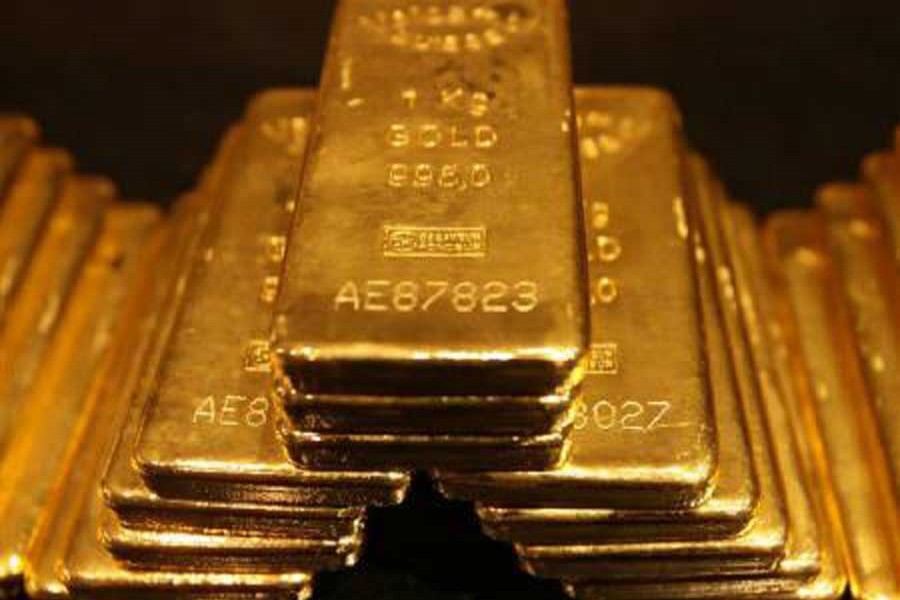
Published :
Updated :

The government is set to carry out drastic reforms in the country's gold sector to remove the existing price mismatch between local and global markets, officials said.
As part of the reform proposal made by the finance ministry, the government will now do an assessment of the volume of gold the country has before rationalising market prices in line with the global trend.
At the same time, it will create a window of gold import and take appropriate steps to export value-added gold to other countries to stop unauthorised ways of trade.
The ministry also proposed forming a secretary-level committee under the leadership of the Bangladesh Bank (BB) governor to implement the reforms.
Finance Minister AMA Muhith sent a note to Commerce Minister Tofail Ahmed for taking the issue into consideration.
The note is supposed to be sent to different departments and agencies for taking their opinions on restructuring the existing system.
The Bangladesh Jewellers' Samity fixed the price of 22-carat gold ornaments at Tk 48,638 per bhori on July 19 last.
The precious metal is priced at Tk 26,000 per bhori in the global market.
"So, there are ghostly activities in the country's gold market. Abnormal practice will have to be stopped. A drastic step has to be taken in this regard and it will have to be taken from a high level. The prime minister has to play a major role in the process," the minister said in the note.
The note said firstly, the price of gold would have to be reasonable in line with the international market price.
Secondly, a system would be introduced to import gold and export ornaments made of gold. Besides, duties on import and export would have to be rationalised.
"A new system will be introduced from a specific date after completion of reform activities in this regard. From the date, the regime will be established," he mentioned in the note.
On March 07 in 2011, the government imposed Tk 3,000 as value-added tax (VAT) instead of Tk 700 as suggested by the commerce ministry.
Since then, the government did not get any single VAT and also there was no import of gold. Gold smuggling continued unabated, according to a commerce ministry source.
In last May, the cabinet committee on economic affairs (CCEA) approved the 'gold policy-2018' to ease import and export of the precious metal and ensure transparency in its trade inside the country.
When contacted, Secretary of Commerce Ministry Shubhashish Bose said, "We sent the 'gold policy-2018' to the cabinet committee on economic affairs. Later, the CCEA sent the policy to the Prime Minister's Office (PMO)."
Neighbouring India earned a total of US$ 42.29 billion by exporting ornaments in 2016.
Bangladesh took an initiative to export ornaments in the 80s. But it was not possible, as local traders found sale of gold in the domestic market more profitable for them, suggest data of the Export Promotion Bureau (EPB).
The country's gold sector fetched only US$ 672 in fiscal year (FY) 2014-15.
There was no specific data on the country's demand for gold, precious metals and stones and their supply, the state-owned entity EPB said.
The country has an annual demand for 20 tonnes to 40 tonnes of gold. And most of them are not imported in the legal way, industry insiders say.
According to a Bangladesh Jewellers Samity source, currently the country's jewellery manufacturers cannot purchase gold through proper channels.
"Our 50 per cent supplies are in recycled gold and the rest come from expatriate workers and travellers."
Presently, he said, there are over 12,000 members under the Bangladesh Jewellers Samity across the country including 1,200 members in Dhaka city.
Despite frequent attempts over phone, vice presidents of Bangladesh Jewellers Samity Enamul Haque Khan and Gulzar Ahmed and general secretary Dilip Kumar Agarwala could not be reached for their comments.
Transparency International Bangladesh (TIB) conducted a qualitative study between July and November in 2017 to identify problems and challenges to the country's gold sector and suggested ways to establish a transparent and accountable trading system.
At a press conference held on November 26 last year, the watchdog placed some recommendations to ensure governance in the gold sector.
They include formulation of an inclusive act, registration of all gold traders following tax payment on all their gold and gold ornaments, and making licensing mandatory for the traders.
They also include banning commercial use of gold coming under Baggage Rules, and importing gold through state-owned banks under the supervision of Bangladesh Bank and the National Board of Revenue (NBR).
In a presentation, TIB researchers said there was an annual demand for 18-36 tonnes of gold in the country, the major share of which came through smuggling.
Gold traders were mostly dependent on smuggled gold and unwilling to import it legally because of high duty, procedural complexities, the delay in getting approval for import and lack of freight transport and insurance facilities, they said.
They also alleged that a section of government officials engaged in checking smuggling and a section of big jewellery traders were active against any move to frame an import policy and ensure transparency in the sector.
Mentioning that around 1,674.88 kilograms of gold were seized at the airport in last four fiscal years, the researchers said the government had been facing an annual revenue loss to the tune of Tk 4.87 billion to Tk 9.74 billion because of gold smuggling.
rezamumu@gmail.com


 For all latest news, follow The Financial Express Google News channel.
For all latest news, follow The Financial Express Google News channel.